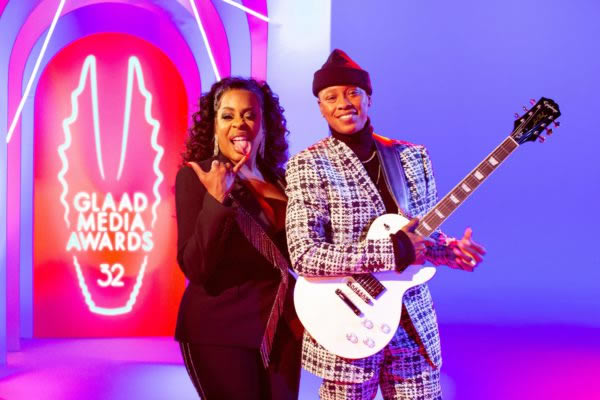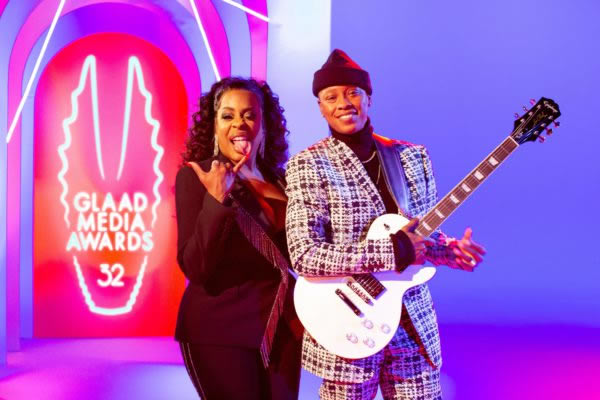
Host Niecy Nash with wife and musical performer Jessica Betts on the 32nd Annual GLAAD Media Awards broadcast. (Photo courtesy Getty Images for GLAAD)
For obvious reasons, Hollywood’s 2021 “Awards Season” has been a little different. Constrained by COVID and foregoing the usual swanky galas and glamorous stage extravaganzas, the entertainment industry has been limited to making the public presentations of its annual honors via virtual livestreams that look pretty much the same as the Zoom meetings and Facetime chats of which we’ve all become so weary.
These shows, though they try hard to generate excitement, can’t help but feel a bit perfunctory. We can easily forgive all this, of course. Everyone, including us, has to make the best of a not-so-great situation, and making sure that “the show goes on” is a big part of maintaining a positive, forward-looking attitude as we all push through the current crisis; and besides, there’s a satisfaction that comes with watching our favorite celebrities fumble through the same awkward gaffes and technical glitches we’ve all become so used to – it turns an event that is normally synonymous with the words “Hollywood elite” into an egalitarian reminder that even movie stars like to sit on the couch in their sweats. Still, that same equalizing effect also serves to highlight the relative absurdity of building up so much importance, so much pomp and hyperbole, over awards shows in the first place. It’s enough to make watching even a show like the Oscars an empty experience.
The GLAAD Media Awards, however, are not the Oscars. While most big entertainment awards are focused (in theory, anyway) on artistic excellence, the GMAs are interested in something with a little more real-world impact – the fair, accurate, and inclusive representation of LGBTQ people and issues in the media – and that difference helped to make the livestream of its 32nd annual presentation, which took place April 8, a surprisingly engaging 90 minutes of screen time.
Of course, it helped that the production was slick, polished, and tightly orchestrated, and that numerous winners had already been announced so that the show could be streamlined into an hour-and-a-half. It was a show that had the self-assuredness that comes from being pre-recorded (or at least, well-rehearsed); and while this may have eliminated the spontaneity that often makes for some of the best highlights in awards shows like this, it also allowed show producers to put together something that felt like a cohesive presentation instead of an awkward work-from-home staff meeting where everyone involved would rather be doing something else.
Unsurprisingly, GLAAD – the world’s largest LGBTQ media advocacy organization, which has been holding the media accountable for its treatment of queer people and issues for nearly four decades – turned the situation into an opportunity to highlight the incredible progress that continues to be made in an uphill fight that is still far from over. Tastefully but assertively, the show threaded key talking points into the festivities; threads highlighting diversity, intersectionality, and the uptick in percentages of youth identifying somewhere on the LGBTQ spectrum were picked up and echoed throughout in speeches from hosts, presenters and winners alike.
A few highlights:
Host Niecy Nash took immediate command of the proceedings, setting a jovial tone and leaning into her status as a “new member” of the community. Nash came out (“came into myself,” as she prefers to say) as LGBTQ and married her wife, musician Jessica Betts, in 2020, and joked about the ongoing process of figuring out her own place on the spectrum by admitting she didn’t know how things would have turned out if “that guy from ‘Bridgerton’” had come along first. Later in the livestream, Betts appeared to sing her song, “Catch Me,” giving Nash the opportunity to introduce her wife’s performance – an undeniably magical moment.
JoJo Siwa, who also came out in 2020, presented the award for Outstanding Children’s Programming to “The Not-Too-Late Show with Elmo.” After her exuberant introduction, in which she acknowledged “the best, most amazing, wonderful girlfriend in the entire world” and proclaimed “Love is awesome…. you can be in love with whoever you want to be in love with and it should be celebrated,” the award was accepted by Elmo himself – another tear-inducing moment in which the progress made in queer acceptance was thrown into stark relief.
Presenting the award for Outstanding Film – Wide Release, USWNT and Orlando Pride Stars Ashlyn Harris and Ali Krieger spoke out in support of trans athletes, saying “Trans students want the opportunity to play sports for the same reason other kids do: to be a part of a team where they feel like they belong.” The award went to “Happiest Season,” the Hulu-produced Christmas romance centered on a lesbian couple played by Kristen Stewart and Mackenzie Davis – again, underscoring the leaps made in LGBTQ inclusion in mainstream entertainment.
Accepting the award for Outstanding Variety or Talk Show Episode for “A Little Late With Lilly Singh: Lilly Responds to Comments About Her Sexuality,” Lilly Singh highlighted the importance of representation by saying, “you know, in other cultures like South Asian culture…there is still a stigma attached to being your true authentic self. I always think that if I was younger and I saw someone on TV who looked like me, that was out and proud about it, maybe I would’ve gotten here faster…I just want to say to everyone at home that looks like me: I am out. I am loud. I am proud. I love myself. And the journey to get here was tough, but it was so worth it. So I want to say that I see you. I recognize you. You are valid. You are beautiful. Nothing about you needs to change.”
The “Gay Geek” contingent received some validation when the award for Outstanding Television Series – Drama went to “Star Trek: Discovery.” Accepted by series stars Wilson Cruz, Anthony Rapp, Ian Alexander, and Blu del Barrio, the win was a much-deserved acknowledgement that the Gene Roddenberry-created franchise has always pushed the boundaries of social acceptance in its content, as well as an uplifting reminder of the power of popular fiction to help us imagine – and aspire to – the better world we want to build.
There were some drawbacks and disappointments, of course – most notably, perhaps, the much-touted “Glee” reunion, in which the stars of the breakthrough Ryan Murphy series came together via virtual conference to pay tribute to departed castmate Naya Rivera and the legacy of her character, Santana Lopez. Die-hard fans may have found satisfaction in seeing this beloved ensemble “together” again, and the spirit in which it happened was unquestionably sincere; even so, the obvious “edited highlights” quality of the segment fell far short of the excitement that might have been made possible by having them unite for a musical number for old time’s sake. Let’s hope for a “do-over” in 2022.
Also unfortunate was the “by the way” status relegated to many of the winners that had been previously announced, especially the electrifying Michaela Cole-created “I May Destroy You,” the HBO show exploring the grey areas of consent in an era hyperaware of “rape culture,” which won for Outstanding Limited or Anthology Series. And while the focus may not have been on glamour, it might still have been fun to see (for example) the fabulous outfit singer Sam Smith might have worn in lieu of baggy sweats had he been able to accept his award for Outstanding Music Artist in person instead of from his living room.
As for who all the winners were, a complete list can easily be found on the GLAAD website, or you can even watch the full presentation on YouTube. Their names deserve to be known, and their accomplishments celebrated.








